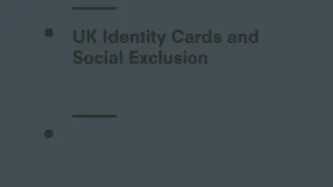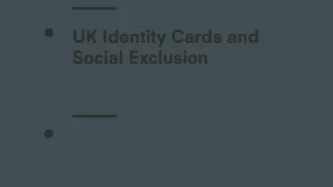Search
Content type: News & Analysis
The first joint report from the Committees on Arms Export Controls (CAEC), released last Friday, highlighted the importance of careful licensing and independent scrutiny for the export of ‘controlled’ goods, to prevent sales that could ‘facilitate internal repression’ in authoritarian regimes abroad. And as we wrote yesterday, the Committees advised that 10 Downing Street should make good on assurances PI was given in March that the problem of unlicensed surveillance exports would be addressed…
Content type: Press release
PI, Genewatch and the Council for Responsible Genetics launch the Forensic Genetic Policy Initiative
Today, 60 countries worldwide operate national DNA databases, and at least 34 more are considering putting them in place. The use of DNA evidence in criminal investigations can bring great benefits to society, helping to solve crimes, convict the guilty and exonerate the innocent. However, the mass storage of DNA samples and computerized profiles in databases raises important human rights concerns. Your DNA profile can be used to track you or your relatives. Your DNA sample has the…
Content type: News & Analysis
Under the Terrorism Act 2000, police agencies in the UK have the power to stop and search within ‘security zones’ as established under order by the Home Secretary. Since February 2001, London has been designated as a security zone.
When this power was used in 2003 at a London protest against the arms trade, the protestors appealed to the courts on privacy grounds. The UK House of Lords ruled that although a stop and search in public was possibly an interference under Article 8(1) of the ECHR,…
Content type: News & Analysis
The Supreme Court of Canada has upheld the legality of the DNA database, including the retroactive collection of profiles. This decision supports the DNA Identification Act of 1998 and sees the taking of DNA from those who are convicted of serious offences not so much as a search but more as an act that enables identification.
In the case R v Rodgers (2006), decided 4-3, the Court was asked to consider, amongst numerous other issues:
Whether collection of DNA samples for data bank…
Content type: Report
This report investigates the probable effect of the proposed UK national Identity Card system on people who are marginalised, who suffer social disadvantage or exclusion, and those who are disabled. The work focuses on the biometrics element of the government’s proposals (specifically facial recognition, ngerprinting and iris scanning).
The Report provides a specific assessment of the recently published biometrics trial conducted by the UK Passport Service (UKPS), and compares these…
Content type: Report
This report investigates the probable effect of the proposed UK national Identity Card system on people who are marginalised, who suffer social disadvantage or exclusion, and those who are disabled. The work focuses on the biometrics element of the government’s proposals (specifically facial recognition, fingerprinting and iris scanning).
Content type:
… and security threats, as well as transform into tools of exclusion. To accompany the soaring demand for a right to … and security threats, as well as transform into tools of exclusion. To accompany the soaring demand for a right to …
Content type:
Content type:
… Identity systems create and facilitate exclusion, insecurity, and surveillance. On Identity Day, PI … story repeat: identity systems creating and facilitating exclusion, insecurity, and surveillance. And yet, we … story repeat: identity systems creating and facilitating exclusion, insecurity, and surveillance. And yet, we …
Content type:
… tagged individuals serious feelings of anxiety, social exclusion, and sometimes causing re-traumatisation. We …
Content type:
… an expert affidavit highlighting global examples of exclusion and discrimination associated with digital …




